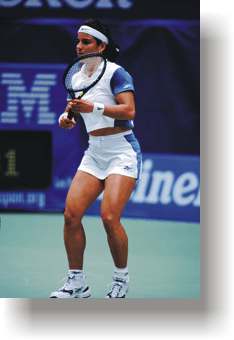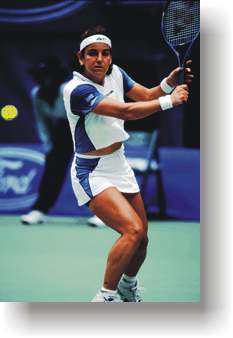<% ns_puts [mkm_getnavbar] %>
A Few Questions
for
Arantxa Sanchez-Vicario
With 26 singles titles including four slams, Arantxa Sanchez-Vicario has been a mainstay on the women's tour for 14 years. During that time, her court coverage and tenacity have been unparalleled. Here's what she had to say about some of the young guns and the state of the game today.
Q. With all the young players out there now, these
teenagers dominating, is there any sense of a little generational warfare
with those of you who are in your ripe old age of later 20s or
30-year-olds? Is there any feeling of, "Let's show what the veterans
can do"?
Arantxa Sanchez-Vicario: I think what
is good for the game is it's a lot of competition right now. I mean, it's
normal that the young ones are coming, a new generation. It was the same
when I started. I was also, you know, very young. I just think it's kind
of like different generations, different personalities, different ages. It
makes the game more interesting, but I don't think it's competition or
anything. It's funny because they call us veterans; only 27 years old
(laughter). Compared with the kids, they are 16, 17, 18, so it's normal.
But the game, it's good for the women's tennis that have all these
different kind of personalities. I think the results is everything. It's nice to be part of
the game as long as I've been there. Keep winning now, try to win many
more tournaments.
personalities. I think the results is everything. It's nice to be part of
the game as long as I've been there. Keep winning now, try to win many
more tournaments.
Q. Do you feel, say, now as opposed to ten years
ago that there are more young players dominating or do you think it's what
you went through back when you were 16 or 17 years old?
Arantxa Sanchez-Vicario: It's
different. I mean, I think the game now is very powerful. They're hitting
the ball probably harder than ten years ago when I started. It was
different styles of game. But it was tough anyway, you know, ten years ago
than it is right now. You just have to keep in your best good shape, try
to play good enough to continue winning. It's kind of different winners
all the time, so it makes more interesting to see, you know, who is going
to be there. But it is good for the game. As long as you feel you can
compete with them, it's fine.
Q. Have you seen a lot of young players who play
like you do, mixing the ball around, getting a lot of shots back, or are
most of the players you have played hitting hard and going for the lines
more?
Arantxa Sanchez-Vicario: Well, I think
when I started, I was 13, it was different styles of game more than now.
Now the youngsters are playing really hard, they're really strong also
physically so they have a lot of power. They just make more winners.
Before, as you say, there was more variety and different styles. The game
is changing. Probably now is much more powerful. If a player has the
abilities to play different shots, can do all very well. You have to also
be ready, you know, faster to compensate the power game.
Q. We're about to enter a new century next year. Do
you see tennis changing a lot in the next 10, 20 years, style of play,
type of players? Arantxa Sanchez-Vicario:
So far, women's tennis has changed. It's much more powerful. The game is
changed a little bit. We have to see in a few more years how it goes. I
think it's good for the game that more  players,
different styles of game. The game is improved, so it's much more
competition, definitely. That's what it's all about, you know, to have
tough matches at the beginning.
players,
different styles of game. The game is improved, so it's much more
competition, definitely. That's what it's all about, you know, to have
tough matches at the beginning.
Q. Is your game where you want it to be right
now?
Arantxa Sanchez-Vicario: Yeah. I think
it's better. After, you know, that I have my injury last year, now it's
coming back. I feel pretty strong.
Q. As a 28-year-old veteran, what goals do you
still have left?
Arantxa Sanchez-Vicario: I don't think you can look for goals. You just try to, you know, be fit, try to be your best. Maybe the Grand Slams, the big ones, you looking more for, you want to do well because they are the big ones. But definitely the ones you play before is good preparation. Just obviously, you know, being your best and play as good as you can. That's all.
Q. Do you think that marriage next year is going to
influence you to change your scheduling, maybe slow down the number of
tournaments you play?
Arantxa Sanchez-Vicario: My
marriage?
Q. I was told you were engaged to be married next
year.
Arantxa Sanchez-Vicario: Yeah. But I
will go to continue play. I mean, I slow down already this year, you know,
some tournaments. Next year it will be probably the same. Has nothing to
do. It's in the middle, the summer. I have plenty of time before that to
play and get ready for my wedding.
Q. May I ask the name of your fiancée?
Arantxa Sanchez-Vicario: You don't
know yet?
Q. No.
Arantxa Sanchez-Vicario: You must be
the only one who doesn't know (laughter). Juan Vehilis.
Q. You added your mother's name to your original
name. Are you going to be changing your name in any way once you get
married?
Arantxa Sanchez-Vicario: Not at the
moment. It will be too long (laughter). It doesn't go Sanchez-Vicario,
imagine putting another one. So far, no. Still Sanchez-Vicario. Maybe when
I stop playing, I shorten it, cut it out a little bit.
Q. You made a lot of nice comments when Steffi Graf
retired. Any other comments?
Arantxa Sanchez-Vicario: Well, I think
I said it all. It's probably, you know, not easy to see her not here at
the tournament after so many years I've been playing on the Tour, too. I
mean, she's been a great competitor and she's also a good friend. All I
say is, you know, I mean it, and it's hard not to see her in the
tournaments anymore.
Q. Who were your role models growing up?
Arantxa Sanchez-Vicario: Chris Evert
and Martina both. Different styles, but both.
Last Updated 5/1/99. To contact us, please email to: webmaster@tennisone.com
TennisONE is a registered trademark of TennisONE and SportsWeb ONE; Copyright 1995. All rights reserved.
